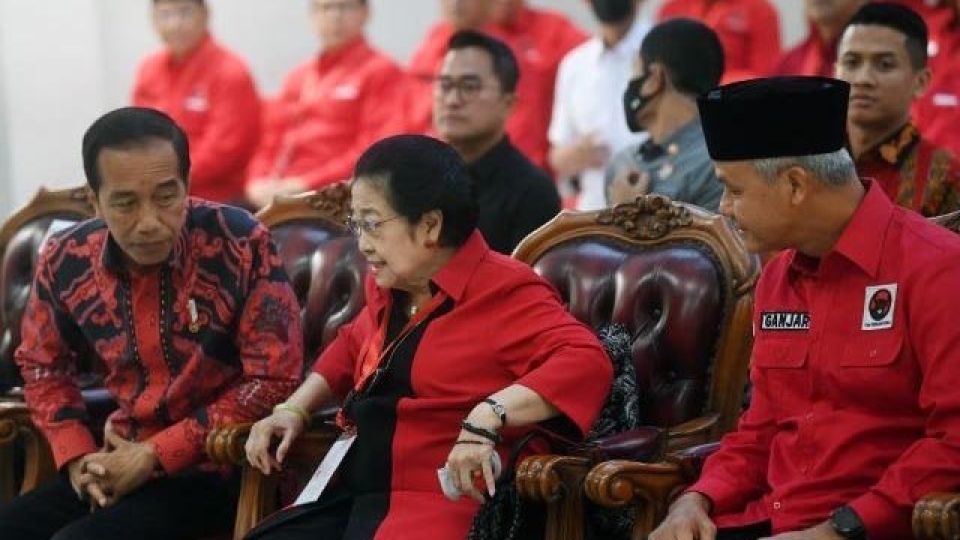June 12, 2023
JAKARTA – Should outgoing presidents decide who will replace them? President Joko “Jokowi” Widodo seems to think so. He openly admitted to playing an active kingmaking role in paving the way for presidential candidates, hinting that he aims to ensure the continuation of development programs happening under his administration. To this end, his legacy will remain even after his retirement.
Is this a good or bad practice for a democracy?
To answer this question, it is important to first unpack what Jokowi has done. In his act of cawe-cawe, a Javanese expression meaning to help finish a job, Jokowi signals endorsement for certain presidential candidates and reportedly nominates his preferred vice presidential candidates to political parties and presidential candidates.
He still tries to consolidate political power by holding meetings among political parties, purposefully excluding parties that support a candidate whom he disagrees with. At the same time, his gravity-defying popularity means his endorsement potentially bolsters the electability of whichever candidates he will openly support (Burhanuddin Muhtadi, 2023).
This provides Jokowi with a valuable bargaining chip: He can exchange his endorsement for support for his legacy projects, including the development of the new capital city in East Kalimantan.
While it may seem understandable that an outgoing leader would want to ensure that their legacy stands, it is a risky business. Exchanging support for endorsement can create a patron-client relationship with the next president.
The outgoing president can think that the new president is in debt with them after receiving their endorsement. This can create a sense of entitlement where the outgoing presidents think they still should have a say in the decision-making process for their legacy projects after leaving office.
The new administrations will also find it challenging to truly implement their vision. There is a possibility that they will not enjoy the full support of those who elect them. Public support and party loyalty will be divided between them and the previous administration. The new administrations will have to take this into consideration when formulating their policies, hereby limiting their policy options.
Furthermore, outgoing presidents who are politically active can transition from kingmakers into playmakers during their post-power era. They can mobilize political supporters to help set policy agenda for the new administration or to make noise when the new administration fails to accommodate their aspirations.
Jokowi should be cautious about this ramification. After all, he experienced a similar thing firsthand. Indeed, Jokowi ran for president under the Indonesian Democratic Party of Struggle (PDI-P) banner while not being the main decision-maker of that party. He did not enjoy wholehearted and unquestionable support from the PDI-P as he did not fully hold party loyalty. Consequently, he had to spend the first couple of years of his presidency consolidating power around him as well as appeasing the patrons that allowed him to contest the presidential race.
The experience should serve as a warning that normalizing such a practice will hinder democracy in the country. As patronage relations increasingly become the norm, the succession of national leaders will increasingly comprise people who are close to the patrons. The country will miss the opportunity to elect the best candidates who emerge from different parts of society and are tested through their experience in civil society, professional associations, academia, enterprises, etc. Instead, the country will see the rise of ladder-climbing politicians par excellence.
In short, the nation may have to pay a hefty price for Jokowi’s attempts at kingmaking.
This is not to say that Jokowi should disappear completely from politics. After all, former presidents can play dignified roles in the country’s politics by providing moral criticisms as elder statespersons.
Close at home, the late former president BJ Habibie exemplified such a role. After the People’s Consultative Assembly (MPR) turned down his accountability speech, he chose a peaceful transition of power and let the democratic process unfold in the country. He then proceeded to establish various foundations and think tanks such as Yayasan SDM-Iptek and the Habibie Center to promote the advancement of technology, education, democracy and human rights in the country.
Habibie also continued to provide moral criticisms. For example, he actively campaigned against the death penalty in the country. In one case, he wrote to President Jokowi to cancel the planned execution of Pakistan national drug convict Zulfiqar Ali, noting that “there are other ways to fight drug [trafficking] other than through the death penalty.”
As the nation learns to move on, Habibie’s legacy lives on, without him trying to perform cawe-cawe.
Indeed, to play an overly intrusive role in deciding the next president signals a troubling trend of a meddling president who does not believe that the democratic political process in the country can run without them. On the other hand, to do otherwise and play an active statesmanship role speaks volumes of trust in the democratic process.
Letting go of power shows a president who believes in the strength of their works and legacy. If Jokowi truly cares about his legacy, he should be careful about his penchant for cawe-cawe.
***
The writer is a researcher with a decade of experience working in various NGOs promoting democracy and human rights. The views expressed are his own.


